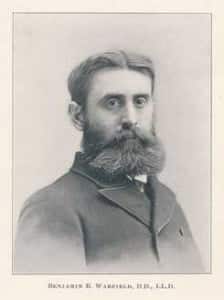The folllowing brief account of the seventy-sixth annual commencement exercises of Princeton Theological Seminary, in 1888, turns more to a most interesting set of comments about the Rev. Dr. Benjamin Breckinridge Warfield, and is useful in that light alone for the picture it provides of the great Professor.
A Princeton Letter
The seventy-sixth commencement exercises of Princeton Theological Seminary were held on Tuesday, May the 8th [1888]. Princeton has prospered this year. Her catalogue records an attendance of 153 students. Some thirty-seven were in the graduating class. Of these, seven are going to the foreign field. Thirty-four are supplied with work, and the rest are not idle from lack of opportunity. The junior class was exceptionally large, containing 58 members.
The venerable Dr. Moffatt has retired after twenty-seven year’s connection with the seminary, and has been elected professor emeritus of history. Rev. Geo. T. Purves, of Pittsburgh, has been elected as his successor.
The college has taken Dr. Francis L. Patton from us to succeed Dr. McCosh. The seminary has lost a David in Dr. Patton, but gained a Solomon in Dr. Warfield, a man of war exchanged for a man of wisdom.
We are proud of Dr. Warfield. He entered upon a most difficult task when he undertook to fill the chair of Polemic and Didactic Theology after Dr. Archibald A. Hodge. He has succeeded. Not in Dr. Hodge’s way, but in his own way. The two men cannot be compared. They were cast in different molds. Their methods are not the same. Our ears are no longer tickled with so many apt illustrations and striking epigrams, but we now receive such clear, clean-cut definition, and patient repetition, that “though fools” we cannot err therein. He is quick in apprehending a question, and never non-plussed, “ready always to give an answer to every man.”
 Dr. Warfield is a thorough scholar, but he is more than a scholar, he is a gentleman. This year the seminary faculty has taken great pains to impress upon the students that a Presbyterian minister should be a gentleman. Our new professor is an ever present example. However great may be the provocation, he ever exhibits the utmost gentleness.
Dr. Warfield is a thorough scholar, but he is more than a scholar, he is a gentleman. This year the seminary faculty has taken great pains to impress upon the students that a Presbyterian minister should be a gentleman. Our new professor is an ever present example. However great may be the provocation, he ever exhibits the utmost gentleness.
“His heart is as soft as a woman’s. To a worm he would give the path.” Yet with all his delicacy of feeling are coupled the sterling qualities of a true manhood, which command the highest respect and reverence.
When the balmy days of Spring came, Dr. Warfield could often be seen walking with his wife about their little garden.
Now this is a small matter; we often see people walking in their garden and think nothing of it. But such a display of domestic feeling is so unusual in Princeton that the eye of the seminary student cannot but see, and his heart cannot but be affected at the sight.
One cannot but feel that the man who walketh in gardens is near to Him “that dwelleth in gardens.”
It was my intention to say something about the undercurrents of thought and of feeling among the students themselves, but my space being limited I shall reserve that for a future letter.
Wm. E. Bryce
May 18, 1888.
The Church at Work, 2.33 (24 May 1888): 4.
